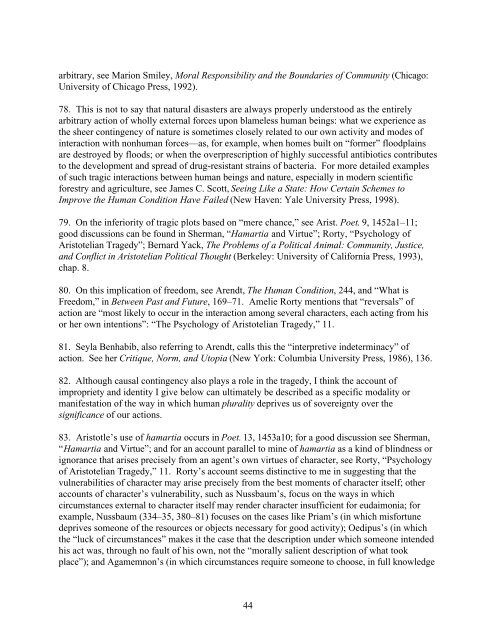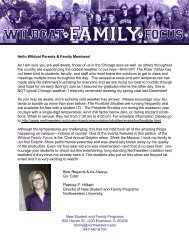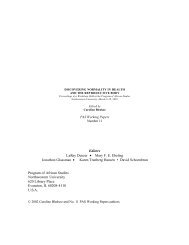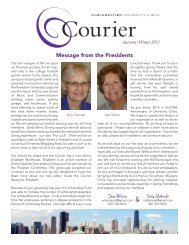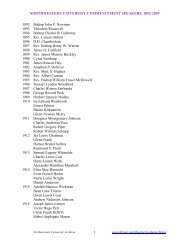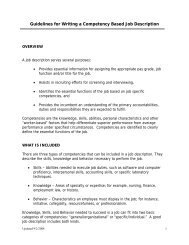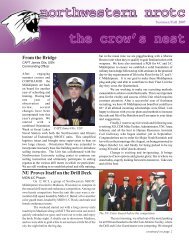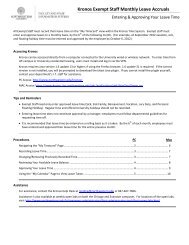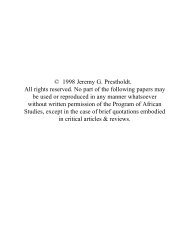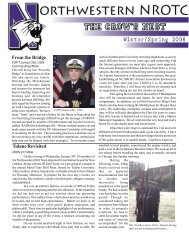TRAGIC RECOGNITION: ACTION AND IDENTITY IN ANTIGONE ...
TRAGIC RECOGNITION: ACTION AND IDENTITY IN ANTIGONE ...
TRAGIC RECOGNITION: ACTION AND IDENTITY IN ANTIGONE ...
You also want an ePaper? Increase the reach of your titles
YUMPU automatically turns print PDFs into web optimized ePapers that Google loves.
arbitrary, see Marion Smiley, Moral Responsibility and the Boundaries of Community (Chicago:<br />
University of Chicago Press, 1992).<br />
78. This is not to say that natural disasters are always properly understood as the entirely<br />
arbitrary action of wholly external forces upon blameless human beings: what we experience as<br />
the sheer contingency of nature is sometimes closely related to our own activity and modes of<br />
interaction with nonhuman forces—as, for example, when homes built on “former” floodplains<br />
are destroyed by floods; or when the overprescription of highly successful antibiotics contributes<br />
to the development and spread of drug-resistant strains of bacteria. For more detailed examples<br />
of such tragic interactions between human beings and nature, especially in modern scientific<br />
forestry and agriculture, see James C. Scott, Seeing Like a State: How Certain Schemes to<br />
Improve the Human Condition Have Failed (New Haven: Yale University Press, 1998).<br />
79. On the inferiority of tragic plots based on “mere chance,” see Arist. Poet. 9, 1452a1–11;<br />
good discussions can be found in Sherman, “Hamartia and Virtue”; Rorty, “Psychology of<br />
Aristotelian Tragedy”; Bernard Yack, The Problems of a Political Animal: Community, Justice,<br />
and Conflict in Aristotelian Political Thought (Berkeley: University of California Press, 1993),<br />
chap. 8.<br />
80. On this implication of freedom, see Arendt, The Human Condition, 244, and “What is<br />
Freedom,” in Between Past and Future, 169–71. Amelie Rorty mentions that “reversals” of<br />
action are “most likely to occur in the interaction among several characters, each acting from his<br />
or her own intentions”: “The Psychology of Aristotelian Tragedy,” 11.<br />
81. Seyla Benhabib, also referring to Arendt, calls this the “interpretive indeterminacy” of<br />
action. See her Critique, Norm, and Utopia (New York: Columbia University Press, 1986), 136.<br />
82. Although causal contingency also plays a role in the tragedy, I think the account of<br />
impropriety and identity I give below can ultimately be described as a specific modality or<br />
manifestation of the way in which human plurality deprives us of sovereignty over the<br />
significance of our actions.<br />
83. Aristotle’s use of hamartia occurs in Poet. 13, 1453a10; for a good discussion see Sherman,<br />
“Hamartia and Virtue”; and for an account parallel to mine of hamartia as a kind of blindness or<br />
ignorance that arises precisely from an agent’s own virtues of character, see Rorty, “Psychology<br />
of Aristotelian Tragedy,” 11. Rorty’s account seems distinctive to me in suggesting that the<br />
vulnerabilities of character may arise precisely from the best moments of character itself; other<br />
accounts of character’s vulnerability, such as Nussbaum’s, focus on the ways in which<br />
circumstances external to character itself may render character insufficient for eudaimonia; for<br />
example, Nussbaum (334–35, 380–81) focuses on the cases like Priam’s (in which misfortune<br />
deprives someone of the resources or objects necessary for good activity); Oedipus’s (in which<br />
the “luck of circumstances” makes it the case that the description under which someone intended<br />
his act was, through no fault of his own, not the “morally salient description of what took<br />
place”); and Agamemnon’s (in which circumstances require someone to choose, in full knowledge<br />
44


